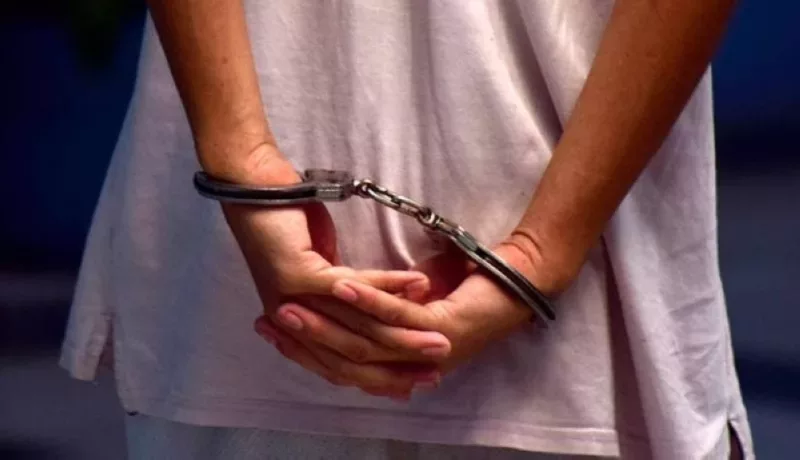Amnesty International documented 50 cases of alleged arbitrary arrests and ten deaths of detained individuals, aiming to identify a “pattern” of arrest and imprisonment during the state of exception in El Salvador. The organization concludes that there are systematic human rights violations in which individual responsibility of officials from three branches of the Salvadoran state may be involved.
The pattern that exists, as explained in a report published on Monday by Amnesty International, includes detentions based on anonymous information, possession of tattoos, or prior criminal records of any kind, as well as expedited hearings against groups of up to 500 people held before a judge with a concealed identity.
From interviews with detainees, it was concluded that there was “submission to torture and cruel and degrading treatment by police officers and guards” and that “beatings” were used to obtain alleged confessions of gang affiliations or as punishment, in addition to extreme overcrowding, unsanitary conditions, lack of essential services, among others.
The international organization concludes that during the state of exception, Salvadoran authorities have committed “serious human rights violations systematically” and that there is “state organization and planning in which the three branches of the State converge.”
In this way, Amnesty International concludes that “the systematic nature of human rights violations could result in individual international criminal responsibility for Salvadoran state agents for non-compliance with their obligations to prevent and punish these acts.”
The conditions described in Amnesty International’s report have been rejected by the Vice President of the Republic, Felix Ulloa, in an interview published by BBC News, in which he said that “the police have not gone into communities to arrest people because they have tattoos or because there has been an anonymous call.”
The vice president argued that in the military cordon of Soyapango, they arrested “people who had a history.” He only detailed that “there is a database.” However, he answered “it could be” to the question about “thousands of detainees with no connection to gangs in jail.”
“There may be a few cases, but when we have been aware of a situation, we have tried to correct it,” he said about the capture of innocent people in the state of exception. “No human work is perfect, but, as I said, perfect is the enemy of the good,” he stated in the interview.
Diario El Mundo: https://diario.elmundo.sv/politica/amnistia-internacional-afirma-detenciones-por-tatuajes-y-denuncias-anonimas-gobierno-lo-niega
Amnistía Internacional afirma detenciones por tatuajes y denuncias anónimas; gobierno lo niega
La organización Amnistía Internacional documentó 50 casos de supuestas capturas arbitrarias y 10 muertes de personas detenidas, con el objetivo de identificar un “patrón” de arresto y encarcelamiento durante el régimen de excepción en El Salvador. La conclusión de la organización es que hay violaciones sistemáticas de derechos humanos en las que podría haber responsabilidad individual de los funcionarios de tres poderes del Estado salvadoreño.
El patrón que existe, explicó en un informe publicado el lunes por Amnistía Internacional, son detenciones basadas en denuncias anónimas, tenencia de tatuajes o antecedentes penales previos de cualquier tipo; además de audiencias exprés contra grupos de hasta 500 personas celebradas ante un juez de identidad reservada.
De entrevistas a detenidos, concluye que hubo “sometimiento a torturas y tratos crueles y degradantes por parte de agentes policiales y custodios” y que “golpizas” para lograr supuestas confesiones de vínculos pandilleriles o como castigo, además de hacinamiento extremo, insalubridad, falta de servicios básicos, entre otros.
La organización internacional concluye que durante el régimen de excepción las autoridades salvadoreñas han cometido “graves violaciones de derechos humanos de forma sistemática” y que hay “organización y planificación estatal en la que confluyen los tres poderes del Estado”.
De esa manera, Amnistía Internacional concluye que “la sistematicidad de las violaciones de derechos humanos podría acarrear para los agentes del Estado salvadoreño una responsabilidad penal internacional individual, por el incumplimiento de sus obligaciones de prevención y sanción sobre estos hechos”.
Las condiciones descritas en el informe de Amnistía Internacional han sido rechazadas por el vicepresidente de la República, Félix Ulloa, en una entrevista publicada por la BBC News, en la que dijo que “la policía no ha acudido a las comunidades a capturar a la gente porque tiene tatuajes o porque ha habido una llamada anónima”.
El vicemandatario sostuvo que en el cerco militar de Soyapango capturaron a “gente que tenía un historial”. Únicamente detalló que “hay una base de datos”. Sin embargo, respondió “podría ser” a la pregunta sobre “miles de detenidos sin ningún vínculo con las pandillas en la cárcel”.
“Podría haber unos pocos casos pero cuando hemos sido conscientes de alguna situación hemos tratado de corregirla”, indicó sobre la captura de personas inocentes en el régimen de excepción. “Ningún trabajo humano es perfecto pero, como dije, lo perfecto es enemigo de lo bueno”, afirmó en esa entrevista.
Diario El Mundo: https://diario.elmundo.sv/politica/amnistia-internacional-afirma-detenciones-por-tatuajes-y-denuncias-anonimas-gobierno-lo-niega

